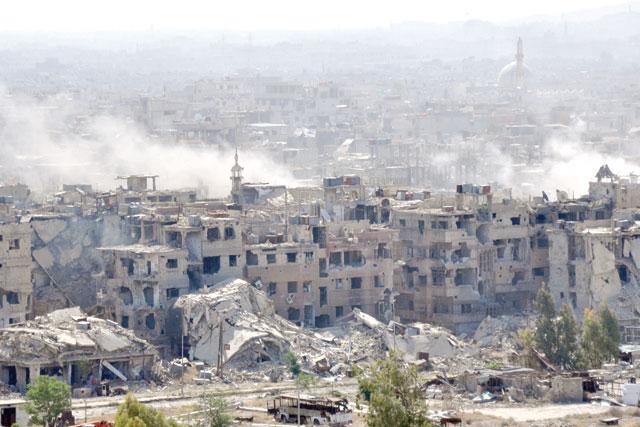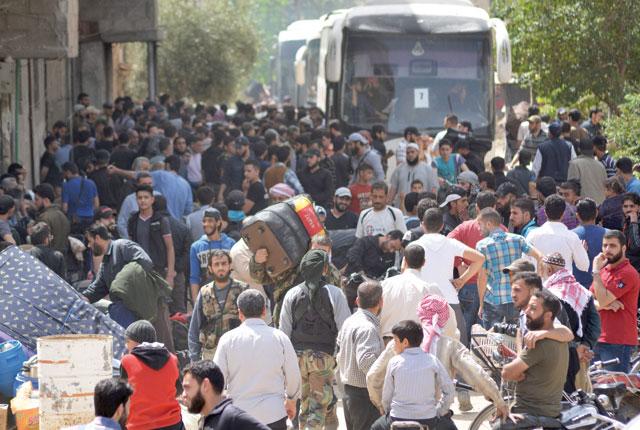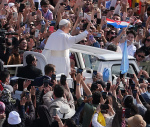You are here
Syrian rebels withdraw from enclave northeast of Damascus
By Reuters - Apr 21,2018 - Last updated at Apr 21,2018

This photo taken on Saturday shows smoke billowing from the Palestinian camp of Yarmouk during regime strikes targeting the Daesh terrorist group in the camp (AFP photo)
BEIRUT/AMMAN — Syrian rebels began withdrawing from an enclave northeast of Damascus on Saturday and will go to northern Syria, state TV and a rebel official said, in a surrender agreement that marks another victory for President Bashar Al Assad.
The withdrawal will restore state control over the eastern Qalamoun enclave, some 40 km from Damascus.
Assad, backed by Russia and Iran, is seeking to wipe out the last few rebel enclaves near Damascus, building on momentum from the defeat of the insurgency in eastern Ghouta, which was the last major opposition stronghold near the capital.
The Organisation for the Prohibition of Chemical Weapons (OPCW) said a fact-finding mission collected samples on Saturday at an Eastern Ghouta site where an alleged chemical weapons attack took place on April 7. The mission arrived in Damascus a week ago.
France and the United States have accused Russia of obstructing access to the site, where medical relief agencies say dozens of people were killed.
The OPCW mission arrived in Syria a week ago to investigate the incident.
Russia and Damascus say the alleged gas attack, which triggered Western missile strikes on Syria, was fabricated.
State TV said rebel fighters and their families would be transported from eastern Qalamoun to Idlib and Jarablus, a rebel-held territory at the border with Turkey, with 3,200 militants and their families expected to leave on Saturday.
The spokesman for one of the rebel groups in eastern Qalamoun said the insurgents had agreed to the deal after intensified Russian shelling killed six people in areas near the town of Al Ruhaiba earlier this week.
“This made the Free [Syrian] Army factions sit at the negotiating table with the Russian side and an agreement was reached the most important articles of which are the surrender of heavy weapons and the departure of fighters to the north,” Said Seif of the Ahmad Abdo Martyr Brigade said.
A first convoy of 10 buses had left Ruhaiba and was being searched in a nearby area before continuing to the north.
Humanitarian situation
Meanwhile, the Syrian military and its allies pressed the bombardment of a besieged enclave south of Damascus.
State TV footage showed clouds of smoke rising from Al Hajar Al Aswad district, part of an enclave including the Palestinian Yarmouk camp that is held by Daesh and other extremist groups.
A commander in the regional military alliance that fights in support of Assad said extremist positions were being targeted with all types of weapons. “Daesh positions are being targeted by Syrian army helicopters,” the commander added.
UNRWA, the UN agency that cares for Palestinian refugees, has said it is deeply concerned about the fate of civilians including some 12,000 Palestinian refugees in Yarmouk and the surrounding areas.
“Displacement continues with people moving to the neighbouring area of Yalda ... to escape the fighting. Some families are staying in Yarmouk, either because they cannot move due to the intensity of fighting or because they choose to remain,” UNRWA spokesman Chris Gunness said.
“We don’t have any numbers on how many people have moved but the humanitarian situation of those in both Yarmouk and Yalda is intolerable.”
Although the conquest of eastern Qalamoun and the enclave south of Damascus will leave just one remaining besieged rebel enclave, north of the city of Homs, large parts of Syria at the borders with Jordan, Israel, Turkey and Iraq remain outside Assad’s control.
Anti-Assad rebels hold a chunk of territory in the southwest and the northwest, and Kurdish-led militias, backed by the United States, control an expanse of northern and eastern Syria.
Related Articles
DAMASCUS, Syria — The Syrian government plans to recover an opposition-held pocket north of Homs city soon after it completes surrender deal
BEIRUT, Lebanon — Syrian rebels began pulling out of an enclave they have surrendered in south Damascus on Thursday, but a few fighters in a
AMMAN — Hundreds of rebels left the last major besieged opposition enclave in Syria on Monday, with thousands more expected to follow, respo
















